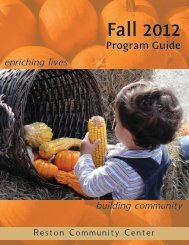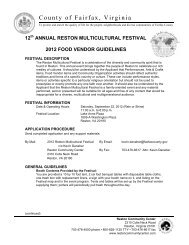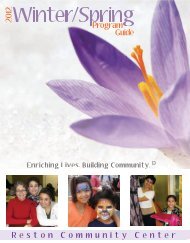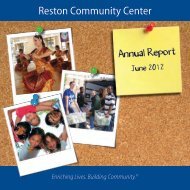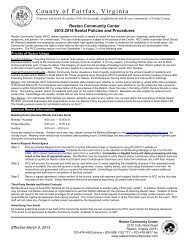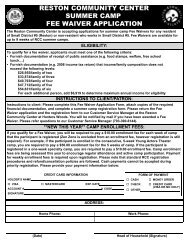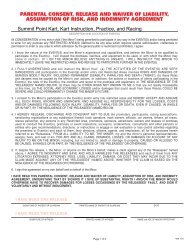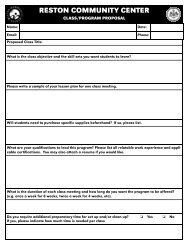Approved Materials - Reston Community Center
Approved Materials - Reston Community Center
Approved Materials - Reston Community Center
Create successful ePaper yourself
Turn your PDF publications into a flip-book with our unique Google optimized e-Paper software.
March 18, 2013 Board of Governors Finance Committee Meeting Report<br />
demand for senior fitness and for summer camps. She said we are unable to do anything further to<br />
address the swimming lessons wait lists, but that we want to ensure that we’re using personnel resources<br />
to address problems in other areas where resolution is feasible.<br />
Leila opened the conversation up for discussion. Bill P. asked about timing. Leila said the Staff would like<br />
to come back at the April 8 Finance Committee Meeting with suggested changes. The Finance<br />
Committee would then make a recommendation to the full Board. Gerald asked if we would have patron<br />
feedback by then. Leila said yes because they planned on surveying people following their regular<br />
classes, and we will try to accomplish that between now and the next meeting.<br />
Cathy asked about the swimming costs. Leila explained the class pricing is equitable in terms of<br />
comparable fees at other public facilities. However, the gate fee is significantly lower since it has not been<br />
changed in 30 years. She said that we want to be sensitive to the fact that the community is subsidizing<br />
its utilization, but we also don’t want a low gate fee to contribute to the over-use and hyper-demand of the<br />
pool. Leila pointed out that non-<strong>Reston</strong> patrons can currently swim for less at RCC than at Fairfax County<br />
Park Authority pools, which is unfair. RCC Aquatics Director Joe Leary agreed that non-<strong>Reston</strong> Fairfax<br />
residents should pay the same rate as they would at a Park Authority pool.<br />
Cathy asked what percentage of non-<strong>Reston</strong> patrons use the pool. Leila and Joe Leary indicated that<br />
non-<strong>Reston</strong> patrons account for about 10 percent of the RCC pool users.<br />
Roger asked how we determine residency at the point of entry for the pool. Joe Leary said Aquatics users<br />
the honor system for the most part, but that it would always be possible to verify a patron’s status.<br />
The Board agreed that they are comfortable with this approach to the pricing review and indicated that the<br />
Staff can move forward with its efforts. Bill P. suggested that the Staff present the Board with an array of<br />
options instead of just one or two suggestions. Leila agreed and said patrons would probably provide<br />
good feedback to that end as well. Leila wants to explore the net impact to see if it would significantly<br />
affect patron utilization of RCC facilities.<br />
The second thing the Staff presented for Board review is the Fee Waiver Program. Leila presented charts<br />
that illustrate fee waiver utilization (see attached) and provided an overview of the program. Qualifying<br />
patrons get a $150 credit to use across all RCC programs. The patron contributes $5 for each program<br />
and the rest is covered by the $150 fee waiver. Participants that meet the eligibility requirements don’t<br />
always use all of the credit that they receive. There is a considerable amount of unused credit, which is<br />
wiped out at the end of each annual period. Patrons are granted $150/individual/year. Gerald asked for<br />
clarification and Leila explained that the charts show utilization and that the Fee Waiver year doesn’t line<br />
up perfectly with either a calendar or fiscal year due to the cycle of registration dates. She said in<br />
aggregate, they offer a pretty reasonable representation of the amount of money used by patrons in this<br />
program. She explained that ultimately, these charts display about $110,000 in potential unrealized<br />
revenue for RCC (meaning that if the Fee Waiver program didn’t exist, these spots potentially could be<br />
filled by paying patrons for that amount of revenue.)<br />
Leila pointed out that for the summer program, one of the charts shows that five households used more<br />
than $900 in fee waivers. This level of utilization exists because there is no limit on participation for<br />
summer camps for fee waiver patrons. This is due to a long-standing belief by the RCC Board that no<br />
child should be turned away from a summer camp or enrichment offering based on socioeconomic status.<br />
Bill P. said that based on the charts, half or more of the money is used for youth or teens. Of the money<br />
budgeted for Aquatics, he suspects a significant portion is for teens as well. He thinks that is money wellspent.<br />
Leila agreed and said she thinks it’s good to review the program regularly to ensure that it is<br />
serving the people that the Board wanted it to reach when it implemented the program a few years ago.<br />
Gerald pointed out that at the end of the day we’re only talking about $110,000, which is a fraction of our<br />
operating budget. Leila confirmed that the Fee Waiver Program total was just shy of 10 percent of RCC’s<br />
total earned revenue, which she believes is a healthy fiscal relationship. This indicates that 90 percent of<br />
RCC patrons do not need financial support. The Fee Waiver Program ensures a good mixture of<br />
participants across all RCC programs and activities. It accomplishes the center’s mission of promoting full<br />
access to its programs while bringing members of the community together for programming and events.<br />
- 3 -




